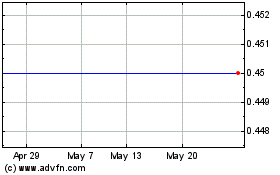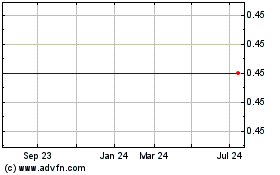TIDMMOIL
RNS Number : 4596P
Madagascar Oil Limited
18 February 2016
NOT FOR RELEASE, PUBLICATION OR DISTRIBUTION, DIRECTLY OR
INDIRECTLY, IN OR INTO THE UNITED STATES, AUSTRALIA, CANADA OR
JAPAN
18 February 2016
MADAGASCAR OIL LIMITED
("Madagascar Oil" or the "Company")
Company Update
Madagascar Oil provides the following update on the status of
its operations, the Partner Process, its financial position and its
funding situation, including the potential requirement for the
Company to propose a delisting of Madagascar Oil from AIM.
The Company is also pleased to announce the granting of the
Environmental Permit for the Tsimiroro Block 3104 Phase 1a
Exploitation by the Office Nationale de l'Environnement ("O.N.E.")
of Madagascar and the signing of the Environmental Management
Programme ("PGE"). This is the first Environmental Permit issued
for an oil exploitation project in Madagascar.
Terms used in this announcement have the same meaning as in the
Company's announcement of 29 September 2015.
OPERATIONAL UPDATE
The Group continues to operate the Steam Flood Pilot Facility in
Madagascar and currently has over 150,000 barrels of Tsimiroro
Crude in its storage tanks at the Tsimiroro Block 3104. Under the
Tsimiroro Development Plan, the Group is permitted to undertake
domestic sales of its Tsimiroro Crude and the Group is in the
process of negotiating offtake agreements with local power
suppliers. Whilst it is in advanced negotiations with Symbion Power
regarding a Fuel Supply Agreement for the Mandroseza power station,
no sales agreement has been concluded and there have been no sales
to date. Pursuant to the terms of the Bridge Facility, any revenues
from oil sales (less associated transportation costs) are to be
applied to repaying amounts outstanding under the Bridge
Facility.
On 29 September 2015, the Company announced that, due to storage
capacity constraints at the Tsimiroro Facility and in response to
the challenging oil price environment that continues to persist
today, the Group had decided to scale down operations and
production from the Steam Flood Pilot, until such time as an
offtake agreement has been signed for the domestic sale of
Tsimiroro Crude and the Partner Process has come to a successful
conclusion. The scale down is being implemented according to plan,
including shut down of steam injection and managed reduction of
production to an average daily-rate of 100-150 barrels of oil per
day ("bopd").
As announced by the Company on 15 December 2014, Madagascar Oil
S.A. has formally requested a two year extension of the exploration
periods for blocks 3105, 3106 and 3107 from the Malagasy
Government. This formal request was made ahead of the scheduled end
date of the current exploration periods and the Group remains
hopeful of receiving these extensions in the near future.
ENVIRONMENTAL PERMIT APPROVAL
The process for obtaining the Environmental Permit was launched
on 23 June 2015, upon submission of the Environmental and Social
Impact Assessment ("ESIA") for Exploitation Phase 1a of the
Tsimiroro Block 3104, in accordance with Decree No. 2004-167
(setting compatibility between Investment and Environment) and
other legal texts including the Madagascar Petroleum Code and the
Production Sharing Contract signed between the Malagasy Government,
represented by OMNIS, and Madagascar Oil S.A.
The evaluation of the ESIA lasted over seven months and was
conducted by:
- A Technical Assessment Committee ("CTE"), coordinated by
O.N.E. for reviewing the technical aspects of the ESIA;
- A Commission of Inquiry and Public Hearing ("CEAP") assessing
the social aspects relating to project execution: 11 public
consultation sessions were held, including 7 sessions in the
municipalities surrounding the Tsimiroro site (Ankondromena,
Andramy, Beravina, Betsipolitra, Soaloka, and Ankavandra,
Morafenobe), 3 sessions in the local regions (Menabe, Melaky and
Bongolava) and a national level Public Consultation
(Antananarivo).
During the evaluation process, key issues submitted in the ESIA
were studied by the CTE and raised during the public consultation
sessions. These included aspects relating to biodiversity, water
management, waste management and emissions, management of grazing
areas, recruitment, rehabilitation of the national road RN1 /
RN1bis and the local content component.
The evaluation process included adjusting the measures suggested
by the Group to address, minimise or correct the impacts of its
activities on the environment and on the local population. This
assessment and the consultations which have followed have resulted
in the signing of the Environmental Management Programme ("PGE"),
which includes all mitigation measures agreed during the ESIA
evaluation.
The granting by O.N.E. of the Environmental Permit and the
signing of the PGE for Exploitation Phase 1a is a significant
milestone in the enforcement of the Production Sharing Contract
signed between Madagascar Oil S.A. and OMNIS, as it is the starting
point of the implementation of the Tsimiroro Block 3104 Development
Plan, approved by the Malagasy Government in April 2015. This is
the first Environmental Permit issued for an oil exploitation
project in Madagascar.
Chief Executive Officer, Robert Estill, commented:
"The granting of this Environmental Permit is a significant
milestone for the country and for the Company, as it is the first
ever permit for the petroleum exploitation industry in Madagascar.
We engaged in open and close dialogue with the National Environment
Office and public institutions during the process of ESIA
assessment and we are looking forward to continuing in this manner.
With this permit, Madagascar Oil's goal is to be an exemplary
company in the petroleum industry as we proceed with the Tsimiroro
field development."
PARTNER PROCESS UPDATE
Since the summer of 2015, the Company has been conducting, with
the assistance of Jefferies and other advisers, a "Partner
Process", to identify and secure a strategic partner(s), to work
with Madagascar Oil on the development and funding of the Tsimiroro
Block. The Company can confirm that this Partner Process is
continuing, but that it has yet to yield any actionable
proposals.
There remain a number of discussions ongoing, but it will take
time to confirm whether any of these discussions can be converted
into an executable deal and there is no guarantee that any of them
will be consummated within any predictable timeframe, if at
all.
Under the terms of the Bridge Facility, the Company provided a
Lender Report to the lenders on 6 January 2016. In this, the
Company reported that it had presented the opportunity to over 140
organisations ranging from E&P companies, oil services
companies, private equity firms and private investors. The Lender
Report explained that a number of leads were being pursued and were
undertaking due diligence including:
-- An Asian consortium, including upstream and infrastructure
expertise, which was undertaking formal technical due diligence
which it hoped to complete within 2-3 months.
-- A southern African Investment firm, which had undertaken
initial internal due diligence and wished to continue with more in
depth due diligence which it estimated would take around 2
months.
-- An Asian E&P company, which was potentially interested in
an asset farm-in deal and had amassed a significant due diligence
team but expected that the due diligence process would take between
2-4 months to complete.
-- Various large multinational oil and gas services companies,
who were at various stages of due diligence and were potentially
interested in arrangements to provide services to the Tsimiroro
Block 3104.
As at the date of this announcement, the Company understands
that these companies are still interested in the project and can
confirm that due diligence is continuing. However, there have been
no formal or informal offers received by the Company from any of
these parties at this stage and no certainty that any offers will
be forthcoming.
FUNDING SITUATION
In parallel with the Partner Process, the Company has also
sought to identify alternative sources of short-term funding for
the Company, either by way of equity, debt, contractor and offtake
partner funding.
With respect to short term funding, as announced on 29 September
2015, the Company entered into a US$21.89 million Bridge Facility,
provided by Outrider Management LLC ("Outrider"), BMK Resources Ltd
("BMK"), SEP African Ventures Ltd ("SEP") and the John Paul Dejoria
Family Trust ("JEP"), together "the Lenders"). The First Tranche
under the Bridge Facility, comprising US$8.9 million of new funds,
was received by the Company by 13 October 2015. Under the terms of
the Bridge Facility, a further second tranche of up to US$8 million
of new funds ("Second Tranche") would be potentially available from
1 February 2016, at the sole discretion of each of the Lenders, if
they were satisfied with the progress being made by the Company
towards achieving its objectives (including pursuant to the Partner
Process).
As at the date of this announcement, approximately US$14.4
million, including rolled up interest, is outstanding under the
Bridge Facility, but no Second Tranche funds have been drawn
down.
Following discussions during January and early February 2016,
the Lenders advised the Company that they were not prepared to
provide the full amount available under the Second Tranche of the
Bridge Facility, but some of them indicated that they may provide
some further funding, subject to additional conditions.
As at 31 December 2015, the Company had approximately US$2.8
million in available cash and US$1.5 million trade and other
payables due during the first quarter of 2016. Accordingly, the
Company urgently needed to secure additional financing in early
2016 to continue the Group's operations and to allow the Company to
operate as a going concern.
(MORE TO FOLLOW) Dow Jones Newswires
February 18, 2016 04:30 ET (09:30 GMT)
Madagascar Oil (LSE:MOIL)
Historical Stock Chart
From Nov 2024 to Dec 2024

Madagascar Oil (LSE:MOIL)
Historical Stock Chart
From Dec 2023 to Dec 2024
